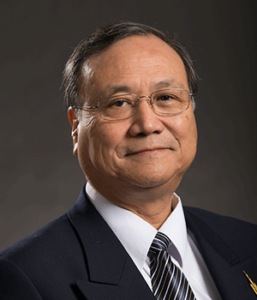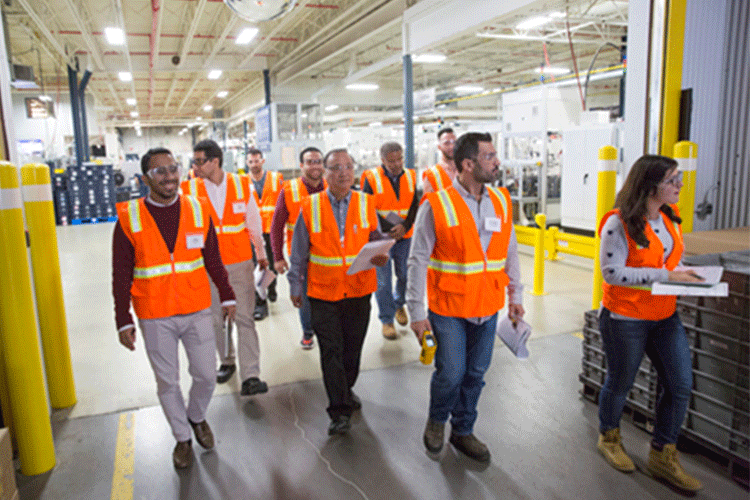UWM engineering students & faculty, and Wisconsin manufacturers to gain from U.S. Department of Energy Department’s unprecedented funding
UWM engineering faculty and students, Wisconsin manufacturers and the Wisconsin environment stand to benefit from a record-breaking investment by the U.S. Department of Energy to help remove barriers to decarbonization in the manufacturing sector. In July, the DOE committed $60 million over the next five years to its 32 university-based Industrial Assessment Centers (IACs) nationwide.
UWM, which operates Wisconsin’s only IAC, will receive an unprecedented grant from the Department of Energy, in addition to funds from industrial partners and the Wisconsin Focus on Energy Program. The investment is part of the Biden Administration’s goal for the U.S. to achieve a clean energy economy.

Under the direction of Ryo Amano (pictured), professor, mechanical engineering, the IAC at UWM has provided in-depth, free energy assessments to more than 600 small- and medium-sized manufacturers and utilities—about 20 per year. On average, they received energy-consumption recommendations to save about $150,000 (15 percent) per facility annually, higher than the national IAC average of $130,000.
This unprecedented round of DOE funding will strengthen the impact of the nation’s energy systems. In addition to recommending strategies related to energy, the centers will broaden their focus to include enhancing decarbonization, electrification, cybersecurity, smart manufacturing, promoting resiliency planning, and increasing the number of businesses served in underrepresented communities.
America’s “best and brightest” students helping manufacturers save energy
UWM’s award-winning IAC – which inspired a visit to UWM from Vice President Kamala Harris earlier this year— has already trained 124 graduate and undergraduate students, who conduct the months-long assessments. Many graduates now work in utilities and energy-related positions in Wisconsin and throughout the nation.
“America’s best and brightest university students are successfully helping local manufacturers reduce pollution, save energy, and cut their electricity bills,” said Secretary of Energy Jennifer M. Granholm, in a DOE press release.
The DOE’s support will help ensure that UWM can train energy engineering students in emerging technologies in the field.
Which Wisconsin manufacturers will benefit from DOE funding
The DOE’s funding also means Wisconsin small- and medium-sized industries, and those located in disadvantaged communities, will receive a substantial economic impact for the next five years, says Amano.
For all clients, Amano says, the program identifies opportunities for optimizing energy efficiency and environmental performance and promotes emerging concepts and technologies, research and development for renewable and alternate supply heat/power for energy-intensive manufacturers and wastewater treatment facilities.
On average, companies implement around 40% of the Industrial Assessment Center’s recommendations, he says, and break even on their investments in two years.
Amano will conduct overall industrial assessments for energy savings, water and wastewater treatment. Smart manufacturing assessments will be conducted by Wilkistar Otieno, associate professor and department chair, industrial & manufacturing engineering. Energy assessments within the foundry industry will be led by Pradeep Rohatgi, State of Wisconsin and UWM Distinguished Professor, materials science & engineering, and director of the UWM Center for Composite Materials.
Thank you to the Wisconsin partners who made this possible
Amano has established an outstanding reputation internationally for his energy research. In Wisconsin, he has developed partnerships with government agencies, industrial entities, non-profit organizations, and other academic institutions, which act as satellite centers.
At every step, U.S. Senator Tammy Baldwin and Wisconsin Governor Tony Evers have strongly supported the IAC and its mission, Amano says.
Government partners include:
- Wisconsin Government Office of Sustainability and Clean Energy
- City of Milwaukee’s Environmental Collaboration Office
Industry partners include:
- We Energies
- Rockwell Automation
- The Wasmer Company
Public-private partnerships include:
- Milwaukee Metropolitan Sewerage District
- Eco BCG
- Wisconsin Manufacturing Extension Partnership
Non-profit organizations include:
- Wisconsin Focus on Energy
- APTIM
- Franklin Energy
- Leidos
- ClearTech Partners
- Milwaukee Water Council
- M-WERC
Academic partners include:
- UW-Parkside
